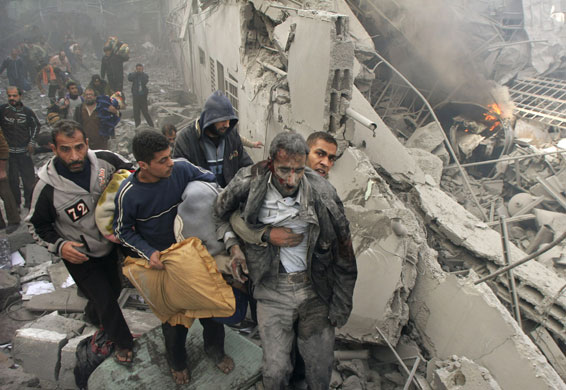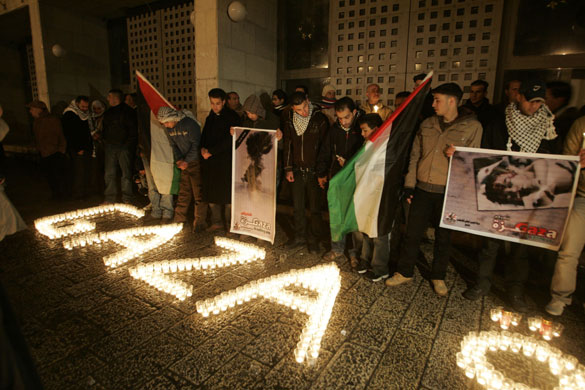 A review by Phil Groom
A review by Phil Groom
Israel’s crimes against humanity must always be seen against the backdrop of the equally terrible crimes of humanity against Israel. But does this make those crimes — its ongoing abuse of the Palestinians and, as I revisit this review at the beginning of 2009, its current assault on the Gaza Strip — any less offensive? Personally, I think not: I originally wrote this review for Evangelical Quarterly in August 2006, during Israel’s war of vengeance against Hezbollah in Lebanon. More than two years later, have any lessons been learned? Has anything changed? It seems not. Apart from these introductory paragraphs, then, this review also remains unchanged, and Sizer’s book remains as relevant and necessary today as it was when originally published.
James warns us (James 3:1) that those who teach will be judged all the more harshly; and similarly, those who represent God to the world will surely be held to even greater account than those who do not know him. This, if it applies to any nation, must surely apply to Israel if they are indeed God’s chosen people.
Hamas’ and Hezbollah’s crimes not withstanding, the State of Israel’s ongoing abuse of the Palestinian people and its neighbours in Lebanon is without a shadow of doubt both a crime against humanity and an offence against God. And the tendency of many Christians to give uncritical support — or even open endorsement — to Israel’s apartheid and wholly disproportionate policies is an aberration that compounds that offence.
If you’re a Christian Zionist you’ll find those opening paragraphs extremely troubling. Are we not, as Christians, required to support the State of Israel? Are not the Jews God’s chosen people? Surely those who bless Israel will be blessed and those who curse Israel will be cursed (Genesis 12:3) — and aren’t statements like these anti-semitic anyway?
Yet as I read this book and observe the current situation it’s difficult to draw any other conclusion. I was brought up in a Brethren assembly, taught to read the Bible from within a dispensationalist framework, and although (as far as I remember) the term “Christian Zionist” was never used, its essence informed my thinking. It took a trip to Israel and time spent with Palestinian Christians, seeing the oppression first-hand, to bring home to me how distorted my thinking was.
Sizer’s experience, it seems, has been similar, describing himself in his introduction as a young Christian ‘devouring Hal Lindsey’s best-selling book, The Late Great Planet Earth, and hearing in person his lectures on eschatology’, then, after a pilgrimage to the Holy Land — ironically, organised by some ‘Christian Zionist friends’ — experiencing a ‘radical change in perspective.’ (p.9-10).
Many Christians will never have an opportunity to visit Israel in person, but Sizer has done a magnificent job in this book, presenting us with a comprehensive overview of Christian Zionism’s variant streams, historical developments and theologies which allows anyone willing to approach the subject with an open mind to make their own assessment. This is supported by a number of helpful charts comparing, for example, the historical development of Christian Zionism since 1800 (p.105) and the different types of Christian Zionism (p.256-257). His analysis is careful, detailed and meticulous, a distillation of his doctoral thesis, which takes his readers through the movement’s history (chapter 1), examining its theological emphases (chapter 2) and exposing its political implications (chapter 3) to finally emerge (chapter 4) with “Biblical Zionism: a covenantal alternative”, an approach that does justice to both the old covenant under Abraham and the new covenant under Christ and offers hope to Jew and Palestinian alike, eschewing violence and leaving no room for anti-semitism.
Each chapter is broken down into manageable subsections and ends with a concise summary of the arguments presented therein, allowing even an impatient reader to benefit and a more patient reader time to pause and take stock.
Sizer’s final conclusions are — for this reader at least — inescapable:
…the choice is between two theologies: one based primarily on the shadows of the old covenant; the other on the reality of the new covenant. In identifying with the former, Christian Zionism is an exclusive theology that focuses on the Jews in the land rather than an inclusive theology that centres on Jesus Christ, the Saviour of the world. It consequently provides a theological endorsement for racial segregation, apartheid and war. This is diametrically opposed to the inclusive theology of justice, peace and reconciliation which lie at the heart of the new covenant. (p.260).
A glossary of terms, appendix (‘Challenging Christian Zionism’, a statement from Sabeel, the Palestinian Liberation Theology Centre in Jerusalem), eleven pages of bibliography and three indices (people, subjects and biblical references) round the book off, whilst footnotes throughout, rather than endnotes, help to keep the entire volume as reader-friendly as possible. This is a book that deserves the widest possible readership. No one who has a concern for the Middle East should ignore the issues raised; to do so is — returning to Sizer’s introduction — ‘nothing less than to perpetuate the evil of the Levite in the Parable of the Good Samaritan who walked by on the other side.’ (p.13).
The time for silence is over: those who are Israel’s true friends must speak out against Israel’s behaviour before this nation pushes itself over the brink and into Armageddon.
Phil Groom, January 2009
Phil Groom is this site’s Webmaster and Reviews Editor. He’s a regular contributor to Christian Marketplace magazine and is the manager of London School of Theology Books & Resources. Any opinions expressed here are personal and should not be taken as representing the views of London School of Theology or of any other group or organisation.





 Remember that phrase in the film
Remember that phrase in the film  Hands up if you have already opened all your Christmas presents. Hands up if you haven’t opened your Christmas presents yet. Hands up if you have only opened some of your Christmas presents. Hands up if you don’t know if you have opened all your Christmas presents yet. In our family we have a tradition that although Father Christmas may leave some small edible gifts in the night by our beds while we are sleeping, we try really hard to restrain ourselves and open our larger gifts after lunch. But why do we give presents at Christmas? Is it because Nicholas gave gifts to a poor family? Is it because the wise men brought gifts to Jesus family? What were the gifts they brought? I like building traditions and so I’d like to suggest that as you share gifts today, or play with the ones you have already opened, you remember the most important gifts of all.
Hands up if you have already opened all your Christmas presents. Hands up if you haven’t opened your Christmas presents yet. Hands up if you have only opened some of your Christmas presents. Hands up if you don’t know if you have opened all your Christmas presents yet. In our family we have a tradition that although Father Christmas may leave some small edible gifts in the night by our beds while we are sleeping, we try really hard to restrain ourselves and open our larger gifts after lunch. But why do we give presents at Christmas? Is it because Nicholas gave gifts to a poor family? Is it because the wise men brought gifts to Jesus family? What were the gifts they brought? I like building traditions and so I’d like to suggest that as you share gifts today, or play with the ones you have already opened, you remember the most important gifts of all.



 Although they were excluded from the invitation list at the Annapolis Middle East Conference last year, everyone from the Royal Family and the Prime Minister down, and even the US President and people the world over, will soon be celebrating the visit of an Iranian delegation to Palestine. This Christmas, we will remember how a group of Iranians visited Palestine carrying funding for an opposition figure the authorities wanted dead. Then the Iranians evaded the authorities, ignoring the correct exit procedures and fled the country. Of course, the Queen, Prime Minister and President have not been celebrating contemporary Iranian involvement, but the historic visit of a past Iranian delegation – the Magi (the ‘Wise Men’ or ‘Kings’) who came to Bethlehem bringing gifts of gold, frankincense and myrrh for Jesus. So without Iran and Iranian involvement, we would not have exchanged gifts on Christmas Day.
Although they were excluded from the invitation list at the Annapolis Middle East Conference last year, everyone from the Royal Family and the Prime Minister down, and even the US President and people the world over, will soon be celebrating the visit of an Iranian delegation to Palestine. This Christmas, we will remember how a group of Iranians visited Palestine carrying funding for an opposition figure the authorities wanted dead. Then the Iranians evaded the authorities, ignoring the correct exit procedures and fled the country. Of course, the Queen, Prime Minister and President have not been celebrating contemporary Iranian involvement, but the historic visit of a past Iranian delegation – the Magi (the ‘Wise Men’ or ‘Kings’) who came to Bethlehem bringing gifts of gold, frankincense and myrrh for Jesus. So without Iran and Iranian involvement, we would not have exchanged gifts on Christmas Day. 14 May 2008 marked the 60th anniversary of the birth of the modern State of Israel. The fundamental problem in the long-running Israel/Palestine dispute is that Jews in the newly formed Israel stole land from the indigenous Arabs, taking it by force. Insofar as Britain and the international community provided the authority, they did so in the face of understandable opposition from those adversely affected. The horrendous fact that Christian evangelicals have to face now is that this theft, with all its subsequent misery for hundreds of thousands of people, was done in their name. Scofi eld Dispensationalism was strong in the 1940s and still lives on, represented in a number of popular Christian books that promote Christian Zionism.
14 May 2008 marked the 60th anniversary of the birth of the modern State of Israel. The fundamental problem in the long-running Israel/Palestine dispute is that Jews in the newly formed Israel stole land from the indigenous Arabs, taking it by force. Insofar as Britain and the international community provided the authority, they did so in the face of understandable opposition from those adversely affected. The horrendous fact that Christian evangelicals have to face now is that this theft, with all its subsequent misery for hundreds of thousands of people, was done in their name. Scofi eld Dispensationalism was strong in the 1940s and still lives on, represented in a number of popular Christian books that promote Christian Zionism. Stephen Sizer’s Zion’s Christian Soldiers? is quite different in style to Andrew’s book, requiring more application from the reader, but it also challenges Christian Zionism. Sizer compares covenantalism and dispensationalism. He explores the relationship between the old and new covenants and shows the danger of taking contemporary events to be the realisation of biblical prophecy. He examines the question of who the Israel of God is, and emphasises the centrality of Christ in the Bible message and the oneness of His people. The land is considered both in its importance in the Old Testament and the relative silence about it in the New, where God’s kingdom on earth is international and His people look for a better inheritance.
Stephen Sizer’s Zion’s Christian Soldiers? is quite different in style to Andrew’s book, requiring more application from the reader, but it also challenges Christian Zionism. Sizer compares covenantalism and dispensationalism. He explores the relationship between the old and new covenants and shows the danger of taking contemporary events to be the realisation of biblical prophecy. He examines the question of who the Israel of God is, and emphasises the centrality of Christ in the Bible message and the oneness of His people. The land is considered both in its importance in the Old Testament and the relative silence about it in the New, where God’s kingdom on earth is international and His people look for a better inheritance.